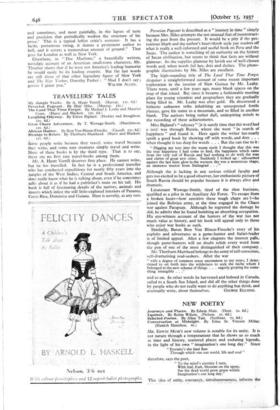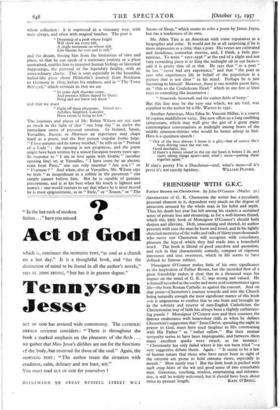NEW POETRY
MR. EDWIN MUIR'S new volume is notable for its unity. It is not nature through a temperament that he shows us so much as time and history, scattered places and enduring legends, in the light of his own "imagination's one long day." Since
"Eternity's the fatal flaw Through which run out world, life and soul" therefore, says the poet, "To the mind's eternity I turn, With leaf, fruit, blossom on the spray, See the dead world grow green within Imagination's one long day.'
This idea of unity, constancy, _simultaneousness, informs the
whole collection : it is expressed in a visionary way, with taste always, and often with magical touches. The poet is "Dreaming of a peak whose height Will show me every hill, A single mountain on whose side Life blooms for ever and is still," and the dream, freeing him from the limitations of time and place, so that he can speak of a stationary journey or a place unattained, enables him to interpret human feelings or historical happenings, the personal or the legendary fatality, with an extraordinary clarity. This is seen especially in the beautiful, ballad-like piece about Hfilderlin's journey from Bordeaux to Germany in 1805, before his madness, and in "The Town Betrayed," which reminds us that we see
"In order dark disorder come,
And prentice killers duped by Death • Bring and not know our doom"
and that we must
"Fight off these phantoms. Inland now • Achilles, Siegfried, Lancelot Have sworn to bring us low."- The journeys and places of Mr. Robin Wilson are not seen so much in the light of that "one long day" as under the immediate stress of personal emotion. In Ireland, Spain, Versailles, Sussex, or Morocco an experience ma' shape itself as a poem, and the first person singular looms large. "I love autumn and its tawny weather," he tells us in " Portrait of a Lady " : the opening is not propitious, and the poem might have been written by a minor Georgian twenty years ago.
In response to "I am in love again with Gothic" (another opening line) or, at Versailles, "I have come by an electric
train from Paris," one can only murmur "Are you ? " or " Vraiment ?" And when, also at Versailles, Mr. Wilson says
he feels "as insignificant as a cobble in the pavement" one simply cannot believe him. But he is capable of genuine perceptions, and is at his best when his touch is lightest and neatest : one would venture to say that where he is most moved he is most epigrammatic, as in "Stele," or " Xauen," or "The Snows of Sleep," which seems to echo a poem by James Joyce, but has a tenderness of its own.
Mr. Allen Tate is an American with some reputation As a biographer and critic. It would not be at all surprising if he is more impressive as a Critic than a poet. His verses are cultivated and fastidious, somewhat morose, and, I think, a little pre- tentious. To write" 1921-1936 ?' at the end of a slight and not very rewarding piece is to fling the midnight oil in our faces— aid it is pretty thin oil at that. He says that "as a poet"
he has "never had any experience," and that "the poet as seer who experiences life in behalf of the population is a picture that is not clear" in his mind. Perhaps he is just humming to himself. However, there is one notable poem here, " Ode to the Confederate Dead," which in one line al least rises to something like incantation : "Stonewall, Stonewall, and the sunken fields of hemp."
But this line may be the very one which, we are told, was supplied to the author by a Mr. Warren in 1931.
Another American, Miss Edna St. Vincent Millay, is a source of copious middlebrow verse. She now offers us a long rambling symposium, which may well give the gist of a great many commonplace conversations at midnight among bores Of the middle nineteen-thirties who would be better asleep in bed.
Here is a specimen speech :
One of the best drivers I know is a girl,—but of course she's been driving since she was ten.
Good mechanic too. If there's a funny sound in the car she hears it before I do, and starts taking things apart—and, what's more—putting them together again.
If that's poetry I'm a Dutchman—and, what's more—if it's























































 Previous page
Previous page